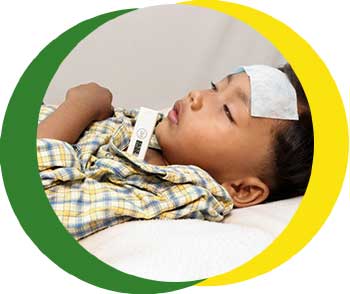Meningitis

Meningitis is an infection of the protective membranes that surround the brain and spinal cord (meninges). It can affect anyone, but is most common in babies, young children, teenagers and young adults.
Symptoms of meningitis, septicaemia and meningococcal disease include:
- headache
- a stiff neck
- a dislike of bright lights
- a high temperature
- cold hands and feet
- vomiting
- confusion
- breathing quickly
- muscle and joint pain
- pale, mottled or blotchy skin
- spots or a rash
- being very sleepy or difficult to wake
- fits (seizures)
There are two types of meningitis:
- Bacterial – a serious infection that requires urgent treatment with antibiotics. Can result in long term complications.
- Viral – generally a less serious infection which doesn’t often result in long term complications. Does not need treatment with antibiotics.
Unfortunately, without tests, it can be extremely difficult to distinguish the two.
However, following the introduction over the past few years of routine vaccinations for babies against infections such a meningococcus, pneumococcus and haemophilus, the rates of bacterial meningitis in children have more than halved. As a result, the number of children affected each year by bacterial meningitis in the UK is now less than 1 in 10,000.
When should you worry?
If your child has any of the following:
- Has a fit / seizure
- Becomes extremely agitated (crying inconsolably despite distraction), confused or very lethargic (difficult to wake)
- Is pale and/or mottled and feels abnormally cold to touch
- Is breathing very fast or going blue around the lips
- Develops a rash that does not disappear with pressure (the ‘Glass Test’)
- Is under 3 months of age with a temperature of 38°C / 100.4°F or above (unless fever in the 48 hours following vaccinations and no other red or amber features)
You need urgent help.
Go to the nearest Hospital Emergency (A&E) Department or phone 999
If your child has any of the following:
- Is complaining of a severe headache and neck stiffness/pain
- Complains of discomfort with bright lights (photophobia)
- Is becoming drowsy (excessively sleepy) or irritable (unable to settle them with toys, TV, food or picking up) – especially if they remain drowsy or irritable despite their fever coming down
- Appears to be becoming confused
- Is finding it hard to breathe
- Seems dehydrated (sunken eyes, drowsy or not passed urine for 12 hours)
- Has extreme shivering or complains of muscle pain (for no obvious reason)
- Is 3-6 months of age with a temperature of 39°C / 102.2°F or above (but fever is common in babies up to 2 days after they receive vaccinations)
- Is not improving after 5 days
- Is getting worse or if you are worried
You need to contact a doctor or nurse today.
Please ring your GP surgery or call NHS 111 – dial 111
We recognise that during the current COVID-19 crisis, at peak times, access to a health care professional may be delayed. If symptoms persist for 4 hours or more and you have not been able to speak to either a member of staff from your GP practice or to NHS 111 staff, then consider taking them to your nearest Emergency Department
If none of the above features are present
Additional advice is also available to young families for coping with crying of well babies – click here.
Self care
Continue providing your child’s care at home. If you are still concerned about your child, call NHS 111 – dial 111
What should you do?
- Only a tiny proportion of children who have a fever and are miserable have bacterial meningitis. Look closely at the symptoms in the red box. If your child has these, they need to see a doctor urgently. If not :
- To make your child more comfortable, you may want to lower their temperature using paracetamol (calpol) and/or ibuprofen as per the instructions on the packaging. However, remember that fever is a normal response that may help the body to fight infection and paracetamol/ibuprofen will not get rid of it entirely.
- Avoid tepid sponging your child – it doesn’t actually reduce your child’s temperature and may cause your child to shiver.
- Encourage them to drink plenty of fluids.
If a rash appears, do the glass test.
Where should you seek help?
- If it is non-urgent, speak to your local pharmacist or health visitor.
- If your child has any of the above features, urgently see your GP. For an urgent out-of-hours GP appointment, call NHS 111.
- You should only call 999 or go your nearest A&E department in critical or life threatening situations.

